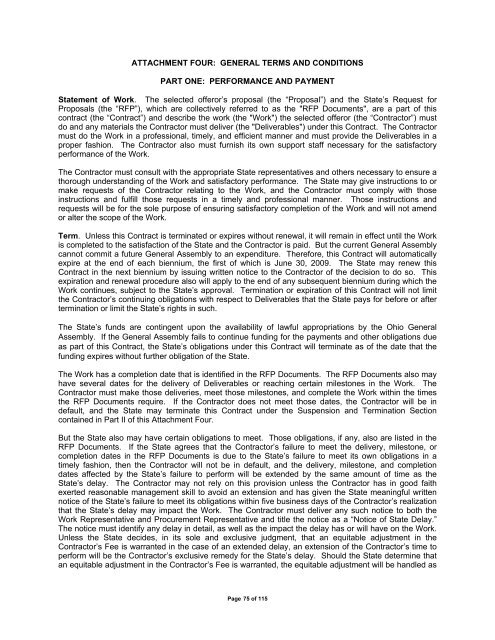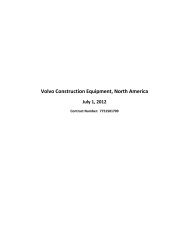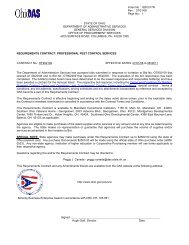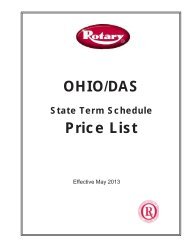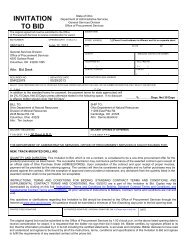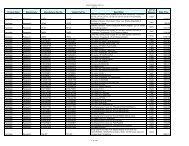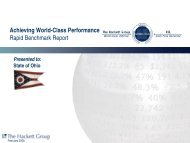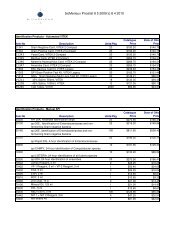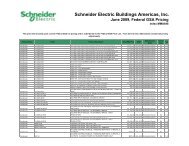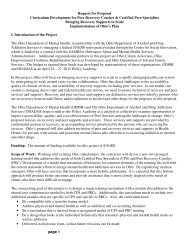REQUEST FOR PROPOSALS RFP NUMBER: 0A1031 DATE ISSUED
REQUEST FOR PROPOSALS RFP NUMBER: 0A1031 DATE ISSUED
REQUEST FOR PROPOSALS RFP NUMBER: 0A1031 DATE ISSUED
Create successful ePaper yourself
Turn your PDF publications into a flip-book with our unique Google optimized e-Paper software.
ATTACHMENT FOUR: GENERAL TERMS AND CONDITIONS<br />
PART ONE: PER<strong>FOR</strong>MANCE AND PAYMENT<br />
Statement of Work. The selected offeror’s proposal (the “Proposal”) and the State’s Request for<br />
Proposals (the “<strong>RFP</strong>”), which are collectively referred to as the "<strong>RFP</strong> Documents", are a part of this<br />
contract (the “Contract”) and describe the work (the "Work") the selected offeror (the “Contractor”) must<br />
do and any materials the Contractor must deliver (the "Deliverables") under this Contract. The Contractor<br />
must do the Work in a professional, timely, and efficient manner and must provide the Deliverables in a<br />
proper fashion. The Contractor also must furnish its own support staff necessary for the satisfactory<br />
performance of the Work.<br />
The Contractor must consult with the appropriate State representatives and others necessary to ensure a<br />
thorough understanding of the Work and satisfactory performance. The State may give instructions to or<br />
make requests of the Contractor relating to the Work, and the Contractor must comply with those<br />
instructions and fulfill those requests in a timely and professional manner. Those instructions and<br />
requests will be for the sole purpose of ensuring satisfactory completion of the Work and will not amend<br />
or alter the scope of the Work.<br />
Term. Unless this Contract is terminated or expires without renewal, it will remain in effect until the Work<br />
is completed to the satisfaction of the State and the Contractor is paid. But the current General Assembly<br />
cannot commit a future General Assembly to an expenditure. Therefore, this Contract will automatically<br />
expire at the end of each biennium, the first of which is June 30, 2009. The State may renew this<br />
Contract in the next biennium by issuing written notice to the Contractor of the decision to do so. This<br />
expiration and renewal procedure also will apply to the end of any subsequent biennium during which the<br />
Work continues, subject to the State’s approval. Termination or expiration of this Contract will not limit<br />
the Contractor’s continuing obligations with respect to Deliverables that the State pays for before or after<br />
termination or limit the State’s rights in such.<br />
The State’s funds are contingent upon the availability of lawful appropriations by the Ohio General<br />
Assembly. If the General Assembly fails to continue funding for the payments and other obligations due<br />
as part of this Contract, the State’s obligations under this Contract will terminate as of the date that the<br />
funding expires without further obligation of the State.<br />
The Work has a completion date that is identified in the <strong>RFP</strong> Documents. The <strong>RFP</strong> Documents also may<br />
have several dates for the delivery of Deliverables or reaching certain milestones in the Work. The<br />
Contractor must make those deliveries, meet those milestones, and complete the Work within the times<br />
the <strong>RFP</strong> Documents require. If the Contractor does not meet those dates, the Contractor will be in<br />
default, and the State may terminate this Contract under the Suspension and Termination Section<br />
contained in Part II of this Attachment Four.<br />
But the State also may have certain obligations to meet. Those obligations, if any, also are listed in the<br />
<strong>RFP</strong> Documents. If the State agrees that the Contractor’s failure to meet the delivery, milestone, or<br />
completion dates in the <strong>RFP</strong> Documents is due to the State’s failure to meet its own obligations in a<br />
timely fashion, then the Contractor will not be in default, and the delivery, milestone, and completion<br />
dates affected by the State’s failure to perform will be extended by the same amount of time as the<br />
State’s delay. The Contractor may not rely on this provision unless the Contractor has in good faith<br />
exerted reasonable management skill to avoid an extension and has given the State meaningful written<br />
notice of the State’s failure to meet its obligations within five business days of the Contractor’s realization<br />
that the State’s delay may impact the Work. The Contractor must deliver any such notice to both the<br />
Work Representative and Procurement Representative and title the notice as a “Notice of State Delay.”<br />
The notice must identify any delay in detail, as well as the impact the delay has or will have on the Work.<br />
Unless the State decides, in its sole and exclusive judgment, that an equitable adjustment in the<br />
Contractor’s Fee is warranted in the case of an extended delay, an extension of the Contractor’s time to<br />
perform will be the Contractor’s exclusive remedy for the State’s delay. Should the State determine that<br />
an equitable adjustment in the Contractor’s Fee is warranted, the equitable adjustment will be handled as<br />
Page 75 of 115


